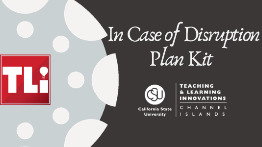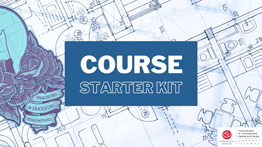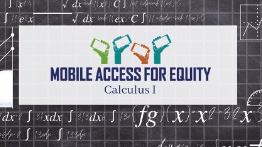This is the second post of the Carefully Curated Series for the Spring 2024 semester.
Canvas Commons is a hub where Canvas users have shared access to courses, content, activities, and pages that can be imported into other Canvas courses to use and adapt. While the quality of available content is variable, there are some hidden gems and sources for inspiration, if not adaptation, depending on the need or interest that brings you there. In this post, I’m sharing five Canvas Commons finds that are worth a look and possibly even an import into your sandbox or course shell.
If you wish to import any of these resources into your course, follow these steps:
- Login to CI Learn (or your Canvas instance for non-CI readers)
- Click on ‘Commons’ located on your Canvas Dashboard in the Global Navigation Sidebar
- Within Canvas Commons, enter the terms listed after Search Terms below each resource
The images included below match the resource’s thumbnail within Canvas Commons and may be a helpful reference if it is not the only resource shown.
Variety of Canvas Breaks

- Author: CSUCI’s very own Leslie Abell!
- Preview the Canvas Breaks resource in Commons
- Search term: Variety of Canvas Breaks
- Fun Facts: 106 downloads; favorited 21 times!
This Canvas Breaks page is a fun find! Intended to make space for intentional pauses in asynchronous courses, Leslie has designed this page in a friendly format and with choices ranging from 5-minute physical activities to desk stretches, and more. This page acknowledges the challenge of an academic workload and encourages students to practice care for their well-being. Please take a look and consider whether this resource (or an adaptation of it) could have a positive impact in your courses.
In Case of Disruption Plan/Kit

- Author: TLi (acknowledgment to LD Lead, Megan Eberhardt-Alstot & team)
- Preview Disruption Plan Kit in Commons
- Search terms: disruption plan
- Fun Fact: The TLi Disruption Plan knowledge base article describes the page in more detail
Disruptions can happen—large and small—so Teaching and Learning Innovations designed a resource that every course (face-to-face or online) should include in Canvas: a page that explicitly communicates what to do in case of disruption. This page includes what to expect of the instructor and what the instructor might expect of students. It is a great starting place for thinking about communication and continuity.
Early Success Module

- Resource Author: Our very own Jason Miller!
- Search term: early success
*A preview link is not available because it’s not a publically available resource
Whether the learning environment is online, face-to-face, or hybrid, an “Early Success” experience is a great way to begin a new semester. For this find, I invited the CSUCI mathematics team to share information about this excellent resource:
The Early Success Module (ESM) was designed by members of the CSUCI mathematics department, including Jason Miller, Chrissy Soderlund, Cindy Wyels, and Phil West. The purpose of the ESM is to address persistently low rates of student success in lower-division courses. Informed by the literature on best practices in learning, the ESM consists of assignments that are designed to have students practice skills that contribute to academic success. The success skills this module implements include:
- attending class meetings regularly
- finding the instructor’s office
- finding the Learning Resource Center
- assessing their skill with prerequisite mathematics
- identifying a potential study group of classmates
- starting to learn about study strategies and growth as a learner (through Bloom’s taxonomy and the study cycle),
- and more.
Our vision for the ESM is that students who might need extra support in their lower-division courses are “flagged” by the module and then contacted by campus team members to connect them to the supports they need. The ESM is presently being piloted in the math department. We hope to share it with faculty in other disciplines in the coming year.
Course Kit

- Author: TLi
- Preview Course Starter Kit in Commons
- Search term: Course kit
- Fun Fact: The TLi Course Kit knowledge base article describes the kit in more detail
Newly provisioned Canvas courses are literally a blank canvas. For anyone new to teaching in Canvas or new to teaching at CSUCI, it can be challenging and labor-intensive to begin. That’s why Teaching and Learning Innovations drew from research in learning, design, and technology to construct a starter kit that complies with the CSU’s Quality Assurance rubric. The starter kit includes a course orientation, a branding package with buttons and banners, and a clean navigation structure. It’s also accessible by design, so anyone looking to start fresh with an accessible and inclusive design can import this starter kit and then book a consultation with TLi’s Accessibility and Inclusive Design Specialist to continue these practices as additional elements get added to the course.
Getting to Know You Survey

- Author: Michael Smedshammer
- Preview the Getting to Know You Survey in Commons
- Search term: Humanizing survey
- Fun Facts: 1.5K downloads; favorited 87 times
A pre-course questionnaire is a great way to learn more about the humans enrolled in the class. It can be coupled with a syllabus quiz to emphasize certain details that you want students to remember, or it can be an opportunity to encourage a set study plan for your course. It is also a confidential place to learn about their preferences, extracurricular responsibilities, or other aspects of themselves that they may be bringing to class. The “Getting to Know You” survey is a concise combination of some of those elements.
Student Success Kit

- Author: Alex Rockey
- Preview the Student Success Kit for Calculus in Commons
- Search terms: welcome to calculus
- Fun Fact: Mobile-first resource design
This page is included in a first-year calculus course designed for mobile access—in other words, the course is designed to be accessed primarily from a mobile phone. What I like about the student success kit is that it has a quick list of tips for success in the class, including planning, practicing problems, and finding study partners. While the specific image is not immediately adaptable, what makes this kit a gem is that it reveals otherwise implicit success strategies, and this is something that anyone can do in their course design. I also like this kit as an example of mobile-first learning design.
What gems have YOU found in Canvas Commons? Please share in the comments!